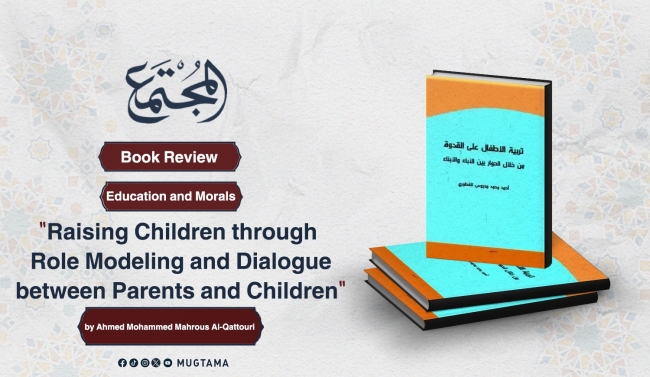Book Review: "Raising Children through Role Modeling and Dialogue between Parents and Children"
This book addresses a critical issue related to raising children based on the principles of good role models through constructive dialogue between parents and children. The author presents an in-depth perspective that combines Islamic values and religious texts with the foundations of psychological and social education, making the book a valuable reference for parents and educators seeking to raise a generation aware of its Islamic values through practical methods relying on dialogue and role modeling.
Key Points Addressed in the Book:
1. The Importance of Dialogue in Personality Building
The author begins by emphasizing the significance of Islamic education for children through parental love and instilling faith-based values and behavioral etiquette via friendly dialogue. This approach bridges gaps and builds trust. The book encourages parents to engage in conversations with their children in a suitable environment, contributing to a balanced personality, refining instincts, and connecting children with positive role models like prophets and righteous individuals. The author highlights the role of Qur'anic stories as an effective tool for instilling faith-based values that align with a child's pure nature and receptivity to learning. This educational approach fosters psychological and social balance, opening opportunities for creativity and positive societal contributions.
2. Role Models Through Qur'anic Stories
The book heavily relies on Qur'anic stories as an educational source, citing examples of prophets' dialogues with their children as models of virtuous role models. It examines conversational examples from the Qur'an, such as the dialogue between Prophet Ibrahim and his son Ismail, and the dialogue between Luqman and his son.
The Example of Ibrahim and Ismail
The author elaborates on Prophet Ibrahim's conversation with his son Ismail regarding the vision of sacrificing him. This dialogue reinforced faith and patience in Ismail, who responded: "O my father, do as you are commanded. You will find me, if Allah wills, of the steadfast." (As-Saffat: 102). This scene represents a high model of faith-based upbringing through calm dialogue and practical role modeling, where both father and son demonstrated compliance with Allah's command, patience, and sincere faith in words and actions.
The Example of Luqman with His Son
Luqman's guidance to his son, as narrated in the Qur'an, represents an ideal model of sound upbringing founded on faith in Allah and adherence to moral values. Luqman taught his son correct beliefs, encouraged filial piety, and instilled the importance of observing Allah in all deeds. He also emphasized the regular performance of prayer, calling others to Allah, patience in adversity, humility, and kindness in interactions. These teachings form a rich educational foundation, helping children balance worship and good conduct with others, strengthening their religious and worldly character.
3. Extracted Educational Principles
The author focuses on several principles, including:
- Practical Role Modeling: Parents should serve as good examples through their daily behavior.
- Patience and Participation: Parenting through dialogue requires patience, providing advice in a friendly manner free of reprimand, as seen in many Qur'anic examples.
- Considering Individual Differences: The author notes that every child is unique, making dialogue an essential tool for understanding their needs and accepting their opinions without arrogance or authoritarianism.
4. The Islamic Educational Approach
Reflecting on the dialogues between Prophet Ibrahim and Ismail and Luqman and his son, several lessons highlight the importance of education:
- Dialogue-Based Upbringing: Parent-child dialogue is a strong foundation for building influential relationships. It is not merely a tool for conveying information but also for understanding the feelings and needs of children. This fosters trust, respect, and a loving, understanding educational environment.
- Instilling Faith-Based Values: Faith in Allah and adherence to His commands are the pillars of Islamic education. Instilling such values requires teaching children the importance of monotheism and urging them to fear Allah in both private and public. A child raised on faith gains inner peace, enabling them to face challenges confidently.
- Patience: Patience is a key value children should acquire to endure difficulties and trials with faith and resilience. When children observe their parents demonstrating patience in challenging situations, they learn this value practically. Teaching patience also fosters responsibility and calm decision-making, helping children address problems with confidence and positivity.
- Good Role Models: Parents are the first models children emulate. When children witness consistent actions and words from their parents, they are naturally influenced. A good role model demonstrates that principles are not just words but actions to be applied. Parents should exemplify honesty, kindness, prayer commitment, and more since actions speak louder than words.
- Participation and Respect: Involving children in decision-making helps them feel valued within the family, teaching them responsibility. This parenting style enhances children's self-respect and helps develop communication and discussion skills. Listening to children respectfully creates a supportive family environment that encourages mutual understanding, enabling children to express their thoughts without fear or hesitation.
----------------------------------------------------
- Author: Ahmed Mohammed Mahrous Al-Qattouri


